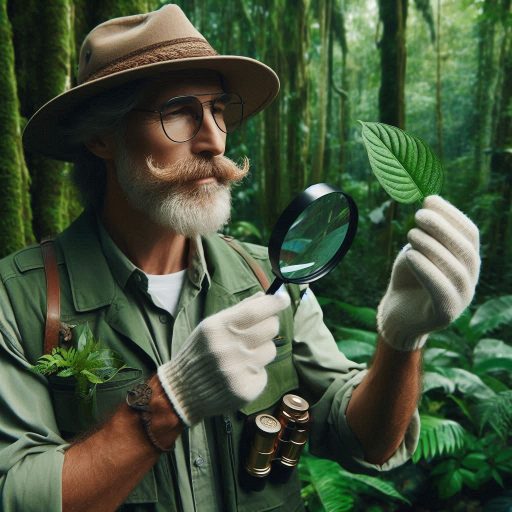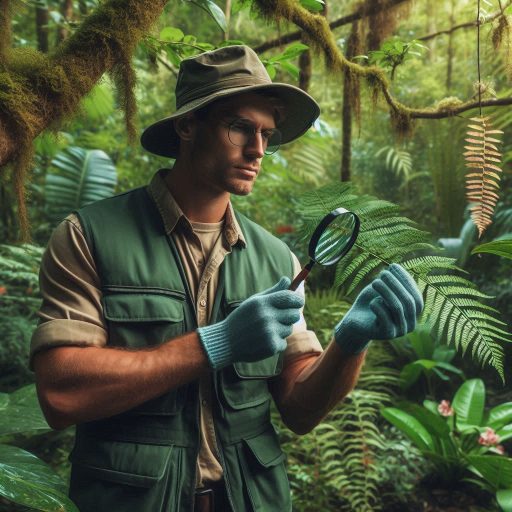Introduction
Ecology degrees play a crucial role in addressing today’s pressing environmental challenges.
As human activity continues to impact natural ecosystems, understanding these dynamics has never been more important.
Ecology, the scientific study of interactions between organisms and their environments, provides valuable insights into biodiversity, conservation, and sustainability.
Graduates equipped with this knowledge are essential for developing effective solutions to ecological problems.
The demand for skilled professionals in the field of ecology continues to rise as society increasingly recognizes the importance of environmental protection.
Organizations in government, non-profits, and private sectors actively seek ecologists to conduct research, inform policy decisions, and implement effective conservation practices.
With climate change, habitat destruction, and species extinction becoming more urgent, the need for ecologists to monitor, analyze, and provide guidance on these issues is critical.
The growing awareness of environmental issues highlights the relevance of ecology degrees, making them an attractive option for students.
Aspiring ecologists can pursue their educational goals at top universities across the United States.
These institutions offer comprehensive programs that equip students with the necessary skills and knowledge to thrive in this vital field.
Yale University
Yale’s Renowned School of the Environment
Yale University boasts a renowned School of the Environment, which focuses on environmental science and ecology.
This prestigious institution consistently ranks among the top universities for environmental studies.
The school emphasizes interdisciplinary education, blending ecological science with social sciences, policy, and management.
Yale’s faculty includes leading experts in various ecological fields, providing students with exceptional learning opportunities.
The school’s commitment to sustainability and environmental stewardship is evident in its curriculum and research initiatives.
Students at Yale benefit from small class sizes, fostering personalized attention and mentorship.
This environment encourages active participation in discussions and collaborative projects, enhancing the educational experience.
Specific Ecology Degree Programs Offered at Yale
Yale offers several degree programs focused on ecology and environmental science.
The Master of Environmental Science (MESc) allows students to specialize in areas like ecology, conservation biology, and ecosystem management.
This program combines coursework with hands-on research, preparing graduates for impactful careers in various ecological fields.
The Bachelor of Science in Environmental Studies provides undergraduates with a solid foundation in ecological principles.
This program encourages students to explore topics such as biodiversity, climate change, and habitat conservation.
Additionally, Yale offers a Ph.D. program in Environmental Science, which focuses on advanced research and scholarly contributions to the field.
Highlight Any Unique Opportunities or Research Initiatives at the University
Yale’s School of the Environment provides unique opportunities for students to engage in groundbreaking research.
The Yale Center for Biodiversity and Global Change is one example.
This center focuses on understanding and addressing global biodiversity loss.
Students can participate in research projects that influence policy and conservation strategies worldwide.
Moreover, Yale operates the Yale-Myers Forest, a 7,500-acre research and teaching forest.
This living laboratory allows students to study forest ecosystems and conservation practices firsthand.
The university also collaborates with various organizations, providing students with internships and fieldwork opportunities.
These experiences enhance practical skills and prepare graduates for successful careers in ecology.
Yale encourages students to participate in global research initiatives, expanding their knowledge and experience.
Programs like the Yale Environmental Leadership and Training Initiative focus on empowering future leaders in environmental science.
These initiatives provide training and resources to tackle pressing ecological challenges worldwide.
Basically, Yale University’s School of the Environment stands out for its comprehensive ecology programs.
Students benefit from a rich educational experience, cutting-edge research opportunities, and a supportive community.
With its commitment to sustainability and innovation, Yale remains a top choice for aspiring ecologists in the USA.
Stanford University
Brief History of Stanford’s Commitment to Sustainability and Ecological Research
Stanford University has long been committed to sustainability and ecological research.
The university established its first conservation program in the late 1960s.
Over the decades, Stanford has developed numerous initiatives focusing on environmental science and policy.
In 2001, the university founded the Stanford Woods Institute for the Environment.
This institute addresses complex environmental challenges through interdisciplinary research.
Stanford actively promotes sustainability on its campus.
The university has implemented various green initiatives, including energy-efficient buildings and sustainable transportation programs.
In 2015, Stanford pledged to achieve net-zero greenhouse gas emissions by 2035.
This commitment reflects the university’s dedication to environmental stewardship and climate action.
Stanford’s emphasis on ecological research also extends to education.
The university offers various undergraduate and graduate programs that prepare students to address global ecological issues.
These programs emphasize the importance of scientific research and community engagement.
The Different Ecology-Related Departments and Programs at Stanford
Stanford University boasts several departments and programs focused on ecology.
The Department of Biology offers a robust ecology program.
This department covers various aspects of ecological research, including population dynamics and ecosystem management.
The Earth System Science program focuses on interdisciplinary approaches to understanding the planet’s systems.
Students explore interactions between the atmosphere, oceans, and terrestrial ecosystems.
This program integrates ecology with climate science, geology, and environmental policy.
Additionally, the Emmett Interdisciplinary Program in Environment and Resources combines ecological study with policy and economics.
This program prepares students to tackle environmental challenges through a multidisciplinary lens.
Students gain a comprehensive understanding of ecological principles and their application to real-world issues.
Cutting-Edge Research Projects or Collaborations in the Field of Ecology at Stanford
Stanford is home to several cutting-edge research projects in ecology.
The Stanford Woods Institute for the Environment supports innovative research aimed at addressing critical environmental challenges.
Researchers focus on biodiversity conservation, climate change adaptation, and ecosystem restoration.
One notable project involves the use of remote sensing technology to monitor forest health.
Researchers analyze satellite imagery to assess forest ecosystems’ health and resilience.
This project helps identify areas at risk of degradation and informs conservation strategies.
Another significant initiative examines the impact of urbanization on local ecosystems.
Stanford researchers collaborate with city planners to study how urban development affects biodiversity.
Their findings guide sustainable urban planning practices.
Stanford also participates in global collaborations, such as the Global Climate Change Alliance.
This initiative focuses on developing strategies to combat climate change and promote sustainable practices worldwide.
Stanford’s involvement emphasizes its commitment to international ecological research and collaboration.
Therefore, Stanford University stands out for its commitment to sustainability and ecological research.
With diverse programs and cutting-edge projects, it prepares students to tackle environmental challenges.
Its rich history and focus on interdisciplinary approaches position Stanford as a leader in ecology education.
Read: Key Roles and Responsibilities of a Chemist in the US
University of California, Berkeley
UC Berkeley’s Strong Reputation in Environmental Studies and Ecology
The University of California, Berkeley, boasts a strong reputation in environmental studies and ecology.
Established in 1868, it is one of the oldest universities in California.
UC Berkeley consistently ranks among the top institutions for environmental science and ecology globally.
Its commitment to research, sustainability, and conservation has solidified its position as a leader in these fields.
The university’s location near diverse ecosystems enhances its ecology programs.
The nearby coastal regions, forests, and grasslands provide unique opportunities for field studies.
This proximity allows students to engage directly with various habitats and species, enriching their learning experience.
Specific Ecology Degree Programs Available at the University
UC Berkeley offers several robust ecology degree programs through its College of Natural Resources.
Students can pursue a Bachelor of Arts (BA) in Environmental Studies or a Bachelor of Science (BS) in Environmental Sciences.
These programs provide a solid foundation in ecology, conservation, and resource management.
For those seeking advanced education, UC Berkeley offers a Master of Science (MS) in Ecology and a Ph.D. in Ecology and Evolutionary Biology.
These graduate programs focus on advanced research methods and ecological theory.
They equip students with the skills necessary to address pressing environmental challenges.
Additionally, UC Berkeley’s interdisciplinary approach allows students to explore topics like climate change, habitat restoration, and biodiversity conservation.
Students have the opportunity to tailor their studies to fit their interests, creating a unique academic experience.
Notable Faculty Members or Research Centers at UC Berkeley Focused on Ecology
UC Berkeley boasts a distinguished faculty known for their contributions to ecology and environmental science.
Notable faculty members include Dr.
Claire Kremen, who specializes in conservation biology and landscape ecology.
Her research focuses on pollinator conservation and ecosystem services.
Another prominent faculty member is Dr. Steven Beissinger, an expert in avian ecology and conservation.
He studies the impacts of climate change on bird populations, providing critical insights for conservation efforts.
The university is also home to several renowned research centers.
The Berkeley Institute for Data Science focuses on ecological data analysis and computational ecology.
This center fosters collaborations across disciplines, enhancing research capabilities.
The Center for Conservation Biology at UC Berkeley promotes research aimed at preserving biodiversity and managing ecosystems.
It conducts vital studies on species conservation and habitat restoration.
In review, UC Berkeley stands out as a top university for ecology degrees in the USA.
Its strong reputation, diverse degree programs, and notable faculty members contribute to a rich educational experience.
Students interested in ecology will find a wealth of opportunities to engage in meaningful research and learning at this prestigious institution.
Read: Essential Skills and Tools for Modern Chemists in America
University of Washington
Top Universities Offering Ecology Degrees in the USA
The University of Washington (UW) is a leading institution for aspiring ecologists.
UW emphasizes environmental sustainability and conservation in its educational approach.
The university recognizes the urgent need to address environmental challenges through research and education.
Students benefit from a strong curriculum that focuses on understanding ecosystems and developing sustainable practices.
UW’s commitment to environmental stewardship makes it an excellent choice for ecology students.
Different Ecology-Related Majors and Programs Offered at UW
UW offers a range of ecology-related majors and programs to cater to diverse student interests.
The Bachelor of Science in Ecology and Evolutionary Biology focuses on the principles of ecology and evolutionary processes.
This program covers essential topics like population dynamics, community ecology, and biodiversity.
Students learn to analyze complex ecological systems and their interactions.
The School of Environmental and Forest Sciences provides additional specialized programs.
These include degrees in Environmental Science, Forest Resources, and Wildlife Conservation.
Each program equips students with the skills needed to tackle real-world ecological issues.
Students can choose majors that align with their career goals, whether in research, conservation, or environmental policy.
Moreover, UW offers interdisciplinary programs that combine ecology with other fields.
For instance, the Program on the Environment allows students to explore environmental studies with a focus on social sciences.
This program encourages a holistic approach to environmental issues, integrating scientific and social perspectives.
Fieldwork and Internship Opportunities Available for Ecology Students at UW
Fieldwork is an integral part of the educational experience at UW.
Students participate in various fieldwork and internship opportunities that enhance their learning.
The university has access to diverse ecosystems, including forests, wetlands, and marine environments.
These settings provide students with hands-on experiences that deepen their understanding of ecological concepts.
UW encourages students to engage in research projects and internships through partnerships with local organizations.
Students can work with conservation groups, government agencies, and environmental nonprofits.
These internships allow students to apply classroom knowledge to real-world situations.
They gain valuable skills while contributing to ongoing research and conservation efforts.
Additionally, the university hosts programs like the Washington Sea Grant, which offers research and internship opportunities in marine ecology.
Students can engage in projects focused on coastal ecosystems, fisheries, and marine conservation.
These experiences prepare students for careers in ecological research, policy-making, and conservation management.
In general, the University of Washington stands out as a top choice for ecology degrees in the USA.
Its focus on environmental sustainability, diverse programs, and ample fieldwork opportunities create a robust educational environment.
Aspiring ecologists can expect to gain practical skills and knowledge to address pressing environmental challenges.
UW equips its students to become future leaders in ecology and conservation efforts.
Read: The Role of Chemists in US Environmental and Sustainability Efforts

University of Michigan
UM’s Commitment to Interdisciplinary Environmental Research
The University of Michigan (UM) stands out for its commitment to interdisciplinary environmental research.
UM emphasizes collaboration among various fields to address complex ecological issues.
This approach integrates knowledge from ecology, biology, environmental science, policy, and engineering.
Faculty members often work with students across disciplines, promoting innovative solutions to pressing environmental challenges.
Research initiatives at UM explore diverse topics, such as climate change, biodiversity conservation, and sustainable land use.
The university fosters partnerships with government agencies and nonprofit organizations.
These collaborations enhance the practical impact of research efforts.
Students benefit from this environment, gaining insights into real-world ecological problems.
Moreover, UM’s focus on interdisciplinary research prepares students for diverse careers.
Graduates emerge as well-rounded professionals equipped to tackle environmental challenges.
This commitment makes UM a top choice for aspiring ecologists.
Ecology-Focused Degree Programs Available at UM
UM offers several ecology-focused degree programs tailored to meet student interests.
Undergraduates can pursue a Bachelor of Science in Environmental Science or Ecology and Evolutionary Biology.
These programs provide a strong foundation in ecological principles and research methodologies.
Graduate students can select from various master’s and doctoral programs.
The Master of Science in Environmental Science emphasizes ecological research and management practices.
Students gain hands-on experience through fieldwork and lab studies, enhancing their understanding of ecosystems.
The Ph.D. program in Ecology and Evolutionary Biology at UM focuses on advanced research.
Students can specialize in areas like conservation biology, evolutionary ecology, and population dynamics.
This rigorous training equips graduates for academic and research careers.
Additionally, UM offers certificate programs that allow students to focus on specific ecological topics.
These options help students customize their education and deepen their expertise in chosen fields.
Unique Resources or Facilities at UM That Support Students Studying Ecology
UM boasts unique resources and facilities that support students studying ecology.
The Biological Station is a notable facility located in northern Michigan.
This research station provides a hands-on learning environment for students.
Here, they can conduct field studies in diverse ecosystems, from wetlands to forests.
The Kellogg Biological Station also offers opportunities for students to engage in long-term ecological research.
Students participate in projects addressing sustainability and environmental change, enhancing their practical skills.
Moreover, UM’s Ecology and Evolutionary Biology Department hosts various seminars and workshops.
These events feature leading experts in the field, fostering collaboration and knowledge exchange.
Students gain insights into the latest research trends and methodologies through these opportunities.
UM also encourages student involvement in organizations focused on ecology and environmental issues.
This involvement helps students build networks and gain practical experience outside the classroom.
Generally, the University of Michigan is a leading institution for aspiring ecologists.
Its commitment to interdisciplinary research, diverse degree programs, and unique resources creates an enriching educational experience.
Students at UM are well-prepared to tackle ecological challenges and contribute to meaningful solutions.
Read: Day in the Life: An Environmental Scientist’s Typical Day
Transform Your Career Today
Unlock a personalized career strategy that drives real results. Get tailored advice and a roadmap designed just for you.
Start NowColumbia University
Overview of Columbia’s Strong Emphasis on Environmental Science and Sustainability
Columbia University, located in New York City, prioritizes environmental science and sustainability in its academic programs.
The university recognizes the urgency of ecological issues in today’s world.
Columbia’s commitment to sustainability is evident through its research initiatives and community engagement.
Faculty members lead innovative projects that address climate change, biodiversity loss, and sustainable resource management.
This strong emphasis on environmental science positions Columbia as a leader in ecological education.
Students engage in hands-on research, making meaningful contributions to environmental conservation efforts.
Columbia fosters a culture of sustainability on campus as well.
The university implements green practices in operations and facilities.
These initiatives promote environmental awareness among students and faculty alike.
Columbia also emphasizes interdisciplinary approaches to solving ecological challenges.
This holistic perspective allows students to explore various facets of ecology and sustainability.
Different Ecology Degree Options Available at Columbia
Columbia offers a range of ecology degree options to meet diverse student interests.
At the undergraduate level, students can pursue a Bachelor of Arts in Environmental Science.
This program focuses on the scientific principles underlying environmental issues and sustainability practices.
Students engage in fieldwork, research, and coursework that prepares them for careers in ecology.
At the graduate level, Columbia offers a Master of Science in Sustainability Management.
This program combines ecological principles with management strategies.
Students learn how to address complex sustainability challenges in various sectors.
Additionally, Columbia offers a Ph.D. in Ecology, Evolution, and Environmental Biology.
This rigorous program prepares students for academic and research careers in ecology.
Columbia also provides opportunities for students to specialize in various areas of ecology.
These include wildlife conservation, marine ecology, and urban ecology.
Students can tailor their education to align with their career goals and interests.
Partnerships or Initiatives at the University That Focus on Ecology and Conservation
Columbia collaborates with various organizations to enhance its ecology programs.
The university partners with the Wildlife Conservation Society (WCS) to promote research and conservation efforts.
This partnership allows students to work on projects focused on biodiversity and ecosystem preservation.
Columbia’s Earth Institute also plays a crucial role in ecological initiatives.
The Earth Institute conducts interdisciplinary research to address global sustainability challenges.
Through this institute, students engage in projects that tackle pressing ecological issues.
These initiatives provide practical experience and valuable networking opportunities.
Moreover, Columbia supports student-led organizations focused on sustainability and conservation.
These groups often organize events, workshops, and volunteer opportunities.
Such initiatives encourage students to actively participate in ecological advocacy and conservation efforts.
In essence, Columbia University stands out for its strong emphasis on environmental science and sustainability.
With a variety of ecology degree options and partnerships focused on conservation, Columbia prepares students to address ecological challenges.
The university’s commitment to sustainability fosters a dynamic learning environment for aspiring ecologists.
Conclusion
Pursuing an ecology degree is increasingly important in today’s world.
As environmental challenges such as climate change, habitat destruction, and biodiversity loss intensify, skilled ecologists play a critical role in finding solutions.
With a degree in ecology, graduates can contribute to conservation efforts, inform policy decisions, and promote sustainable practices.
The demand for knowledgeable professionals in this field continues to grow, making it a vital area of study.
Top universities in the USA offer exceptional ecology degree programs that equip students with the necessary knowledge and skills.
Institutions like Stanford University, Duke University, and the University of California, Berkeley stand out for their robust ecology programs.
These universities provide access to cutting-edge research, state-of-the-art facilities, and experienced faculty members who mentor students in their academic pursuits.
Such resources enhance the overall learning experience and foster a strong foundation in ecological principles.
Additionally, schools such as the University of Florida and Colorado State University offer unique opportunities for hands-on fieldwork.
Students can engage in research projects that allow them to study diverse ecosystems and collect data in various environments.
This practical experience is invaluable for developing field skills and applying theoretical knowledge to real-world situations.
[E-Books for Sale]
The Big Book of 500 High-Paying Jobs in America: Unlock Your Earning Potential
$19.99 • 500 High-Paying Jobs • 330 pages
Explore 500 high-paying jobs in America and learn how to boost your career, earn more, and achieve success!
See All 500 High-Paying Jobs of this E-Book
1001 Professions Without a Degree: High-Paying American Jobs You Can Start Now
$19.99 • 1001 Professions Without a Degree • 174 pages
Discover 1001 high-paying jobs without a degree! Unlock career tips, skills, and success strategies for just $19.99!




